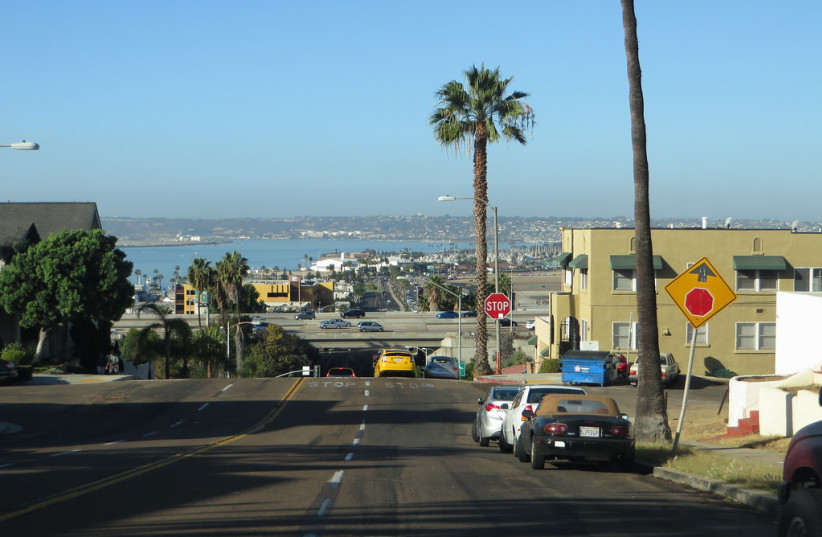Two months after proclaiming that July would henceforth be known locally as “American Christian Heritage Month,” the board of supervisors in El Dorado County, California has reversed course.
The county’s elected governing body unanimously rescinded the proclamation Tuesday following backlash from local Jews, the American Civil Liberties Union, and others who said it inappropriately advanced the idea that the United States is a Christian nation.
“I commend the board for reflecting on and revisiting the proclamation, and I applaud them for rescinding it,” Rabbi Evon Yakar of Temple Bat Yam in South Lake Tahoe said after the vote. Yakar was one of several local residents who spoke out against the proclamation at the board meeting where the proclamation was rescinded. “I believe they did a good thing in reflecting on the divisiveness this caused.”
Marla Saunders, a massage therapist in South Lake Tahoe, said she was “verklempt” after the decision, using the Yiddish term meaning “overcome by emotion.” Saunders, who is Jewish, had started an online petition calling on the board to rescind the proclamation. The petition had more than 1,000 signatures as of Sept. 19.
“I am definitely teary with joy,” she said.

The five supervisors in El Dorado County, a rural area with 200,000 residents south of Lake Tahoe, voted on July 18 to mark every July as American Christian Heritage Month. The vote passed 4-1, though one supervisor maintains that she actually abstained but was recorded as an “aye.”
The language of the proclamation is taken from the platform of the Constitution Party, a conservative political party formed in the 1990s that advocates for hands-off governance and Christian values. Coming at a time of rising Christian nationalist sentiment across the United States, the proclamation stated that there have been “attempts to change and distort our history.”
Purpose of the move
The purpose of the proclamation is “to recognize the impact of religious beliefs on America’s history,” according to the text approved at the July meeting. The proclamation cites several prominent references to God inscribed in the country’s national institutions, monuments and founding documents, and states “that the rich spiritual and diverse religious history of our nation, from its founding to the current day be affirmed.”
“Be it further proclaimed, that any effort to remove, obscure, or purposely omit such history from our nation’s public buildings and educational resources be rejected in the strongest manner,” the document says.
The proclamation was introduced by Supervisor John Hidahl, who said before the vote, “This great nation was founded not by religionists but by Christians. Not on religions but on a foundation of Christian principles and values,” according to the Sacramento Bee. The proclamation, he continued, is “clearly stating: don’t forget our history.”
The proclamation’s critics said it violated the principle of the separation of church and state and promoted one religion over others. In an Aug. 25 letter to the board of supervisors, the ACLU of Northern California said the proclamation “conveys that the County supports, promotes and endorses specific religious beliefs and, as such, violates the California Constitution.”
The state constitution contains even more stringent requirements regarding the separation of church and state than the establishment clause of the U.S. Constitution, which prohibits federal laws “respecting an establishment of religion.” The California Constitution states that “Free exercise and enjoyment of religion without discrimination or preference are guaranteed.”
After Tuesday’s vote rescinding the proclamation, Angelica Salceda, the ACLU of Northern California’s director of democracy and civic engagement, said her organization is “happy” about the new vote.
“The resolution suffered from constitutional infirmities,” she said in a statement. “The county has no business supporting, promoting, or endorsing specific religious beliefs. We think this decision is good for all residents of El Dorado County.”
El Dorado Supervisor Brooke Laine, who said that her abstention in the July vote was incorrectly recorded as an “aye” and that she also “regretted” her indecision, put the matter on the board’s agenda for Tuesday’s meeting. After 45 minutes of public discussion, the board rescinded it, 5-0.
“I very much regretted the initial vote and my participation in it,” Laine said again on Tuesday, noting that community members used their public comment time to both oppose and support the resolution.
“At the end of the day, it was agreed by the board that there was a reason the Founding Fathers created a separation between church and state, and that we had blurred that line, although it was not our intention,” she said. “It felt like we got it right this second time. I commend my colleagues for recognizing and correcting” the mistake.
Public pressure and media coverage contributed to the board’s eventual decision, Laine said, as did the “threat of litigation” from the ACLU. “We couldn’t afford that,” she said.
In a caveat to his praise of the board’s new decision, Yakar added that the supervisors didn’t correct their fundamental error, which was promoting the idea of America as a Christian nation.
“This was not about celebrating one group’s heritage” in the vein of Pride Month or American Jewish Heritage Month, he said. “This is about the clear use of language in the proclamation that our country was founded as a Christian country, and that is what we are celebrating.”
That important nuance should have been explicitly discussed by the board on Tuesday, Yakar said, adding, “I don’t feel the supervisors went far enough to address that.”
Saunders added a cautionary note too, saying that some opponents of the proclamation wouldn’t have come to Tuesday’s board meeting if law enforcement hadn’t been there. “They wouldn’t feel safe,” she said.
But still, she said, she’s pleased with the result of Tuesday’s vote.
“We beat back hate and division,” she said. “The way the community came together made me more optimistic about our country and the county I live in.”
A version of this story originally appeared in J. Jewish News of Northern California and is reprinted with permission.
